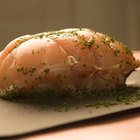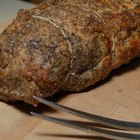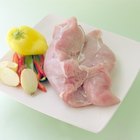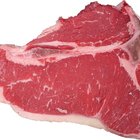DronG/iStock/GettyImages
A brine is a seasoned saltwater mixture that infuses raw meat with additional flavor and moisture. While water is the more common ingredient in a brine, you can replace the water with another liquid. Vinegars -- particularly apple cider vinegar and balsamic vinegar -- feature in numerous pork recipes and are common ingredients in marinades. In many cases, however, it is better to incorporate vinegar after you soak pork rather than using it in a brine. If you do add vinegar to a brine, you must balance it appropriately with the other ingredients.
Brining Meat
Brining meat reduces the amount of moisture it loses when you cook it. Salt in a brine causes some proteins in meat to soften, creating microscopic spaces between the fibers. The meat absorbs liquid from the brine to fill the spaces, ultimately saturating the flesh with excess moisture. Raising the water content of meat gives it liquid to spare while it cooks, when the heat of the oven, stove or grill causes some of the moisture to evaporate. By flavoring the brine with herbs and spices, you infuse the meat with those flavors when the proteins absorb the seasoned liquid.
Why Brine with Vinegar?
Vinegar is a relatively strong cooking acid, almost as strong as citrus juice. Acidic ingredients initially break protein bonds, much like salt. But after prolonged exposure, acid causes proteins to form bundles and tighten, forcing moisture out of the meat. Ultimately, a brine or marinade that contains vinegar causes meat to toughen, ruining its texture. Though vinegar can tenderize the surface of raw pork, it begins to toughen that meat after 2 hours. You should brine pork for at least 4 hours, though, to give the meat enough time to absorb the additional moisture. This means vinegar isn't the most ideal brining liquid.
Play It Safe and Baste
Rather than adding vinegar to brine, the best way to include it in a pork recipe is to baste or sauce the meat with a mixture that includes vinegar. Acid does not adversely affect cooked meat the way it affects raw meat. If the meat is cooking or is fully cooked, applying a vinegar-rich sauce is not detrimental to its texture, and the flavor of vinegar in the finished dish is more robust.
Balance Is Key
You can include vinegar in brine without destroying the pork’s texture, but you must exercise caution regarding the ratio of ingredients in the brine and how long you brine the pork to prevent the meat from toughening. Use 2 tablespoons of vinegar for every cup of water in the brine. Prepare enough brine to submerge all of the pork. Do not soak the meat for more than 2 hours. Always brine your meat in the refrigerator to maintain a safe temperature that prevents the growth of harmful bacteria.
Related Articles

How to Brine Pork Loins

How to Cook Corned Beef Without Being ...

How to Cook Carolina Pulled Pork With ...

How to Do Corned Pork

How to Save Overcooked Pork

How to Soak Deer Meat in Baking Soda

How to Make a Good Brine for Pork

Dilution In Cooking

How to Reduce the Vinegar Taste in ...
How to Cook Center Cut Pork Steaks
How Long Do I Soak Lamb in Vinegar ...

Should Pork Chops Be Washed Before ...
Can You Slow-Cook a Brined Pork?

How to Cook Boneless Turkey Breast

Can You Marinate a Pork Shoulder ...

How to Make a Juicy Pork Tenderloin

Perfect Way to Cook a Pork Chop in the ...

How to Inject a Brisket

The Effect of Salt on the Tenderness of ...
How to Slow Cook a Pot Roast With Beef ...
References
Writer Bio
Lamar Grey has been writing about cooking and food culture since 2010. He has ghostwritten eight cookbooks. Grey entered the culinary industry in 2003 as a prep cook in a full-service restaurant. He subsequently served as a baker and head cook on three award-winning kitchen staffs.